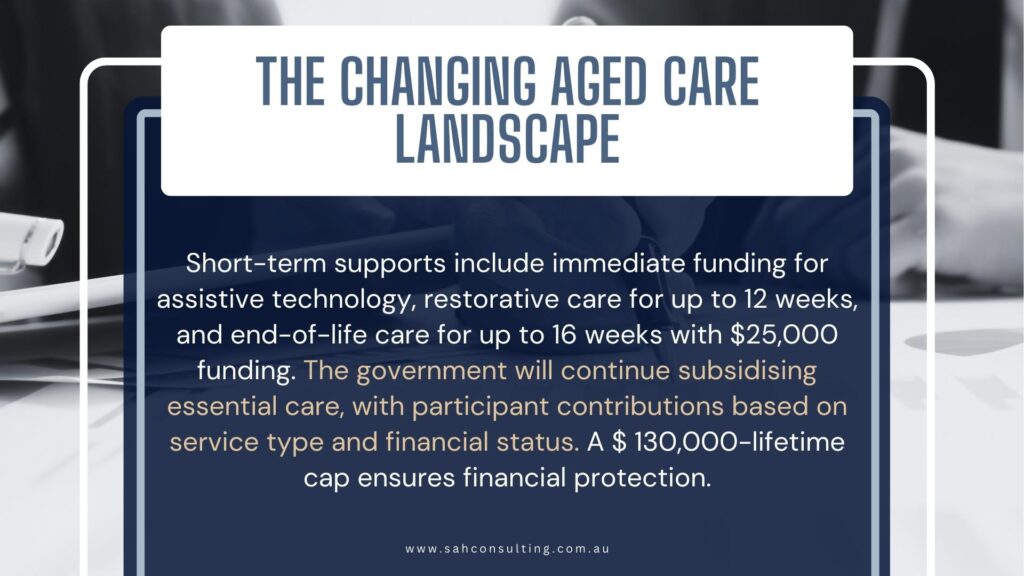The aged care sector in Australia is undergoing significant change. The Support at Home Program just began on 1 July 2025. It replaced the Home Care Packages (HCP) Program and the Short-Term Restorative Care (STRC) Programme. These reforms aim to simplify services, improve care quality, and enhance access to in-home support for older Australians. However, for aged care providers, the transition presents complex regulatory challenges. This is why many are turning to aged care consultancy services.
With the New Aged Care Act, providers must navigate new classification systems, funding structures, compliance requirements, and the shift to a Single Assessment System. Many providers are overwhelmed by the scale of these adjustments and the potential risks of non-compliance. The consequences of errors or delays in registration could include financial losses, operational disruptions, and difficulty securing approval to operate under the new system.
Given the tight deadlines and strict compliance expectations, many aged care providers are considering whether consulting support is necessary to manage this transition effectively. Is working with an aged care registration consultant the best way to ensure a smooth, compliant registration process?

The Changing Aged Care Landscape
Aged care in Australia is changing with the Support at Home Program, streamlining services, improving accessibility, and aligning funding with care needs. Providers must quickly adapt to new regulations, classifications, and funding structures.
The program introduces a Single Assessment System for efficient access to care, with current recipients automatically transitioning at their service level. A new classification system replaces Home Care Packages, with eight funding levels adjusted quarterly. Participants can carry over unspent funds and be reassessed if needs increase.
Now, each participant will have a single Support at Home provider, responsible for coordinating care, including assistive technology and home modifications under the AT-HM Scheme. Self-management is an option with provider approval.
Short-term supports include immediate funding for assistive technology, restorative care for up to 12 weeks, and end-of-life care for up to 16 weeks with $25,000 funding. The government will continue subsidising essential care, with participant contributions based on service type and financial status. A $ 130,000-lifetime cap ensures financial protection.
Providers must comply with stricter regulations, invoicing Services Australia based on actual services delivered. Regulatory risks include financial mismanagement, delayed readiness, and inadequate participant engagement. Preparing for these changes is crucial to avoid service disruptions.
Registration Challenges
The new aged care regulatory model introduces universal provider registration, requiring each provider to register once across all government-funded aged care programs. This simplifies reporting for providers delivering services across multiple programs, including residential aged care, Home Care Packages (HCP), and the Commonwealth Home Support Programme (CHSP).
However, the transition comes with challenges like:
- Complex documentation requirements.
- Stricter regulatory compliance.
- Potential resource constraints.
The Aged Care Quality and Safety Commission will oversee registration, categorising providers into six risk-based groups based on service complexity. This determines their obligations and regulatory oversight.
Support at Home providers must register in the relevant categories to continue delivering services. Existing HCP and Short-Term Restorative Care (STRC) providers will be automatically assigned to the appropriate categories, with a confirmation process to validate their service alignment.
Stronger oversight will give the Commission greater authority to monitor providers and respond to risks. Reporting requirements under the new Aged Care Act will be clarified in early 2025, with further details available on the department’s website. Non-compliance could lead to financial and operational consequences, making it essential for providers to prepare for these changes.
The Consultant’s Role
Navigating the New Aged Care Act requires a thorough understanding of regulatory requirements, documentation standards, and risk management. Firms that provide aged care consultancy services play a critical role in ensuring providers meet compliance expectations, streamline registration, and optimise their operations for the Support at Home Program. Here’s what you can expect from them:
Strategic Registration Support
A consultant assesses a provider’s capabilities, identifying gaps in relation to the Support at Home Program. They develop a customised registration strategy to meet compliance standards and facilitate approval. Providers receive expert guidance on regulatory updates and the July 2025 implementation process.
Documentation and Compliance Assistance
Consultants ensure all registration materials are accurate and complete, preventing potential submission issues. They help develop policies and procedures aligned with new regulations and create scalable documentation templates for future use.
Risk Mitigation Strategies
To prevent compliance failures, consultants assess regulatory risks and develop mitigation plans. They offer ongoing monitoring, adaptation strategies, and periodic compliance health checks to ensure continued alignment with the new aged care regulations.
Financial and Operational Impact Analysis
Consultants evaluate the cost-effectiveness of self-registration versus external support, identifying opportunities for savings and efficiency. They streamline registration processes to reduce administrative burdens and prevent unnecessary delays.
Post-Registration Support
Beyond registration, consultants assist with staff training, transition planning, and strategy refinement. They provide ongoing advisory support and monitor provider performance to ensure sustained compliance and operational success.
Successfully navigating the complexities of the new aged care regulations requires expert guidance, and that’s where SAH Consulting comes in. We help aged care providers adapt to the Support at Home Program with confidence, ensuring seamless registration, compliance, and operational efficiency.
Beyond regulatory support, we also specialise in aged care marketing strategy, helping providers attract and retain clients in an increasingly competitive landscape. With our help, you can focus on delivering quality care while we handle the complexities of compliance, strategy, and growth.
Final Thoughts
The transition to the Support at Home Program 2025 marks a significant shift in Australia’s aged care landscape, bringing new registration requirements, compliance standards, and operational challenges. Successfully adapting to these changes is crucial for providers to continue delivering high-quality care while maintaining financial and regulatory stability.
At SAH Consulting, we provide the expertise and strategic support needed to navigate the complexities of the New Aged Care Act. Our aged care consultancy services cover everything from registration and compliance to operational efficiency and aged care marketing strategy. We help providers stay ahead in a rapidly evolving industry.
Let SAH Consulting guide you through the process, so you can focus on what matters most—delivering exceptional care.
Book a Free Consultation today.
